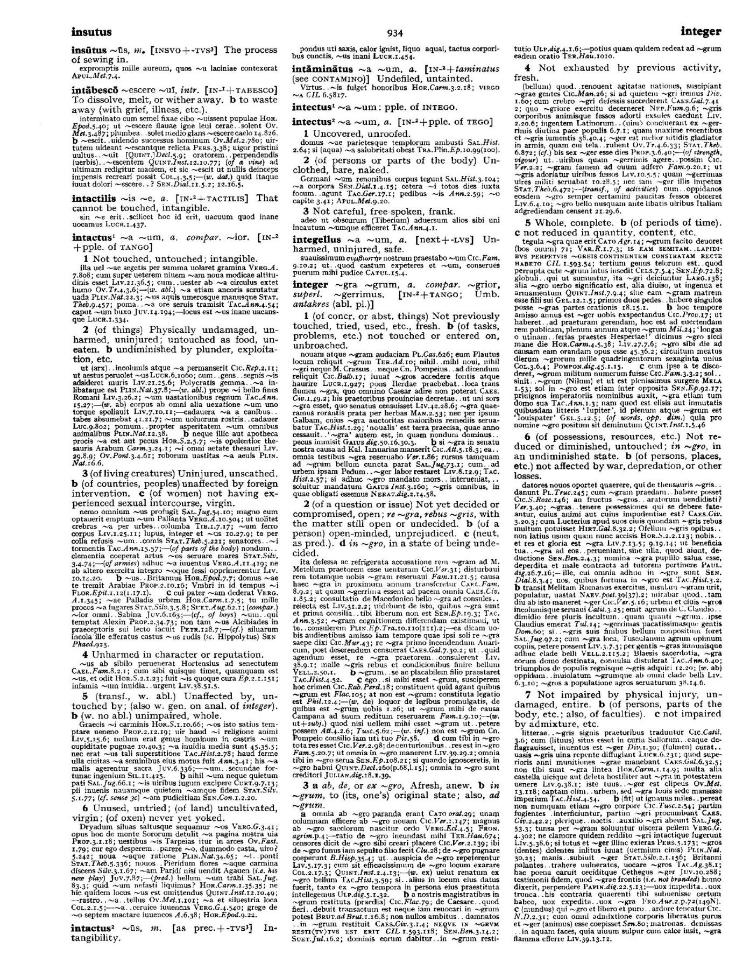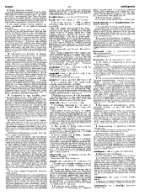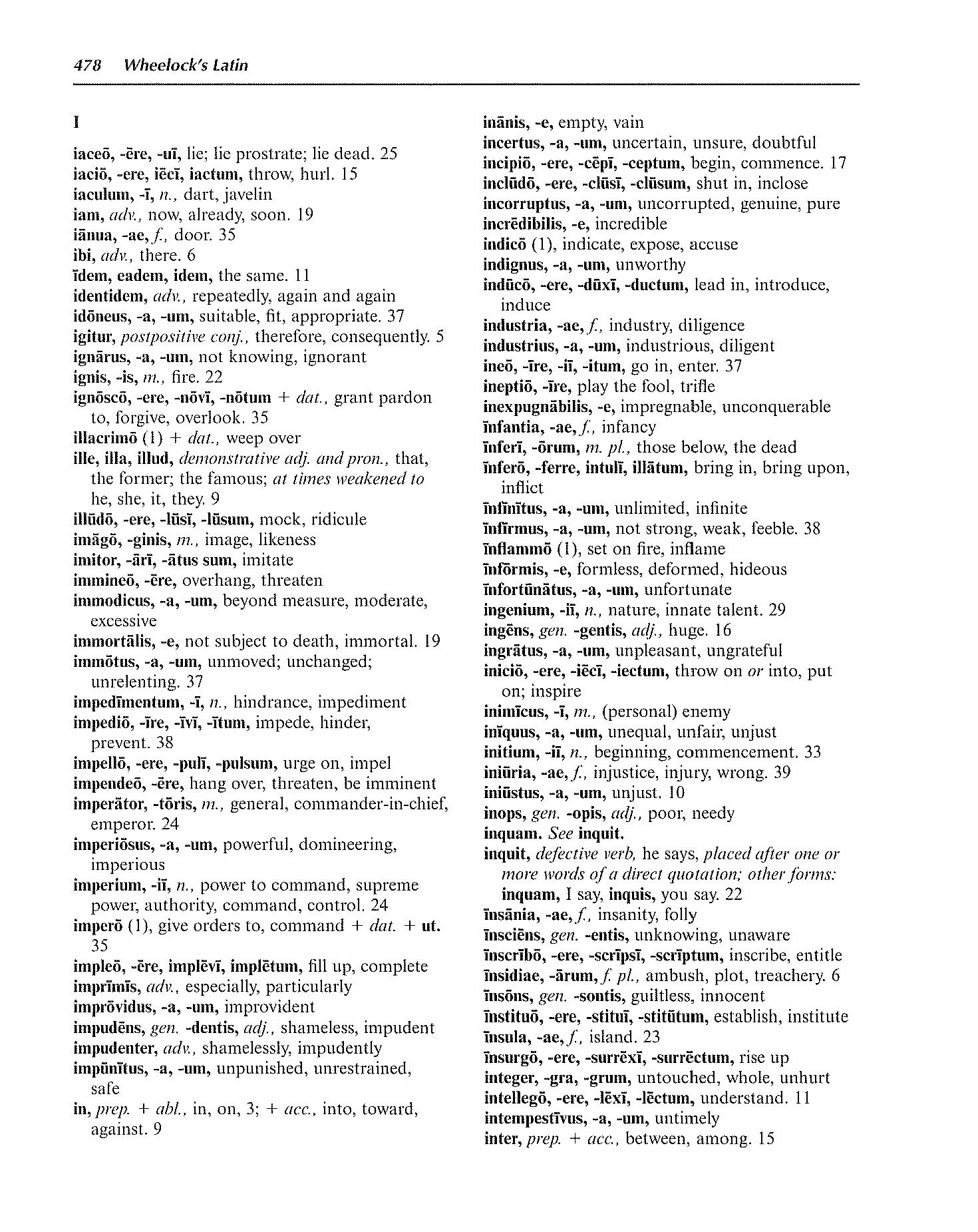
page_listing.tpl
page_subListingDetails.tpl
sub_listingDetails_style1.tpl
sub_listingDetails.title.tpl
integer untouched
integer is a Latin Adjective that primarily means untouched.
Definitions for integer
Wheelock's Latin
Adjective
- 1
untouched, whole, unhurt
Oxford Latin Dictionary
Adjective
- 1
(of concr. or abst. things) Not previously touched, tried, used, etc., fresh. (b) (of tasks, problems, etc.) not touched or entered on, unbroached.
- 2
(of a question or issue) Not yet decided or compromised, open; re ~gra, rebus ~gris, with the matter still open or undecided. (b) (of a person) open-minded, unprejudiced. (c) (neut. as pred.). (d) in ~gro, in a state of being undecided.
- 3
(a) ab, de, or ex ~gro, Afresh, anew. (b) in ~grum, to (its, one's) original state; also, ad ~grum.
- 4
Not exhausted by previous activity, fresh.
- 5
Whole, complete. (b) (of periods of time). (c) not reduced in quantity, content, etc.
Sentences with integer
Latin to English
Integer vitae scelerisque purus.Compare He that is unstained in life and pure from guilt.
Iuvat integros accedere fontis atque haurire, iuvatque novos decerpere flores insignemque meo capiti petere inde coronam unde prius nulli velarint tempora musae; primum quod magnis doceo de rebus et artis religionum animum nodis exsolvere pergo, deinde quod obscura de re tam lucida pango carmina, musaeo contingens cuncta lepore.Compare I love to approach virgin springs and there to drink: I love to pluck fresh flowers, and to seek an illustrious chaplet for my head from fields whence ere this the Muses have crowned the brows of none; first because my teaching is of high matters, and I proceed to unloose the mind from the close knots of religion; next because the subject is so dark and the lines I write so clear, as I touch all with the Muses's grace.
Ignotus hostis prius paene, quam video, integer intactusque fugio.Compare Safe and untouched, they fled from an unknown enemy almost before they saw him.
Data sources
Notes
- Definitions
- Frederick M. Wheelock, Wheelock's Latin, 6th ed., rev. Richard A. LaFleur (New York, NY: HarperCollins Publishers, 2005): 478.
- P. G. W. Glare, Oxford Latin Dictionary, Vols. 1-8 (Oxford: Clarendon Press, 1982): 933.
- Word frequencies
- Christopher Francese, "Latin Core Vocabulary," Dickinson College Commentaries, last modified 2014, http://dcc.dickinson.edu.
- Paul B. Diederich, The Frequency of Latin Words and Their Endings, PhD diss., (Columbia University, 1939).
- Louis Delatte, Suzanne Govaerts, Joseph Denooz, and Etienne Evrard, Dictionnaire fréquentiel et index inverse de la langue latine [Frequency Dictionary and Inverse Index of the Latin Language] (Liège, Belgium: Laboratoire d'analyse statistique des langues anciennes de l'Université de Liège [L.A.S.L.A.], 1981): 125.
Bibliography
Allen, Joseph H. Allen and Greenough's New Latin Grammar for Schools and Colleges: Founded on Comparative Grammar. Edited by James B. Greenough, George L. Kittredge, Albert A. Howard, and Benjamin L. D'Ooge. Boston, MA: Ginn & Company, 1903.
Crystal, David. A Dictionary of Linguistics and Phonetics. 6th ed. Oxford, UK: Blackwell Publishing, 2008.
Delatte, Louis, Suzanne Govaerts, Joseph Denooz, and Etienne Evrard. Dictionnaire fréquentiel et index inverse de la langue latine [Frequency Dictionary and Inverse Index of the Latin Language]. Liège, Belgium: Laboratoire d'analyse statistique des langues anciennes de l'Université de Liège (L.A.S.L.A.), 1981.
Diederich, Paul B. The Frequency of Latin Words and Their Endings. PhD diss., Columbia University, 1939.
Francese, Christopher. "Latin Core Vocabulary." Dickinson College Commentaries. Last modified 2014. http://dcc.dickinson.edu/latin-vocabulary-list.
Gildersleeve, Basil L., and Gonzales Lodge. Gildersleeve's Latin Grammar: Third Edition, Revised, and Enlarged. 3rd ed. London, England: Macmillan and Co., 1903.
Glare, Peter G.W. Oxford Latin Dictionary. Vols. 1-8. Oxford, England: Clarendon Press, 1982.
Krüger, Bernd. "Latin Conjugation Tables." Cactus2000. Accessed May 5, 2023. https://latin.cactus2000.de/index.en.php.
Pierson, Nick. "Sound of Text." Accessed October 26, 2019. https://soundoftext.com.
Wheelock, Frederick M. Wheelock's Latin. 6th ed. Revised by Richard A. LaFleur. New York, NY: HarperCollins Publishers, 2005.
Wiktionary Contributors. "Victionarium." Wikimedia Foundation, Inc. Updated March 18, 2019. https://la.wiktionary.org/wiki/Victionarium:Pagina_prima.
Citation
Chicago (17th ed.)
Allo Contributors. "integer, integra, integrum (adj.) - Latin Word Definition." Allo Latin Dictionary. Last modified . Accessed February 20, 2026. http://ancientlanguages.org/latin/dictionary/integer-integra-integrum.
Entry created on . Last updated on .








